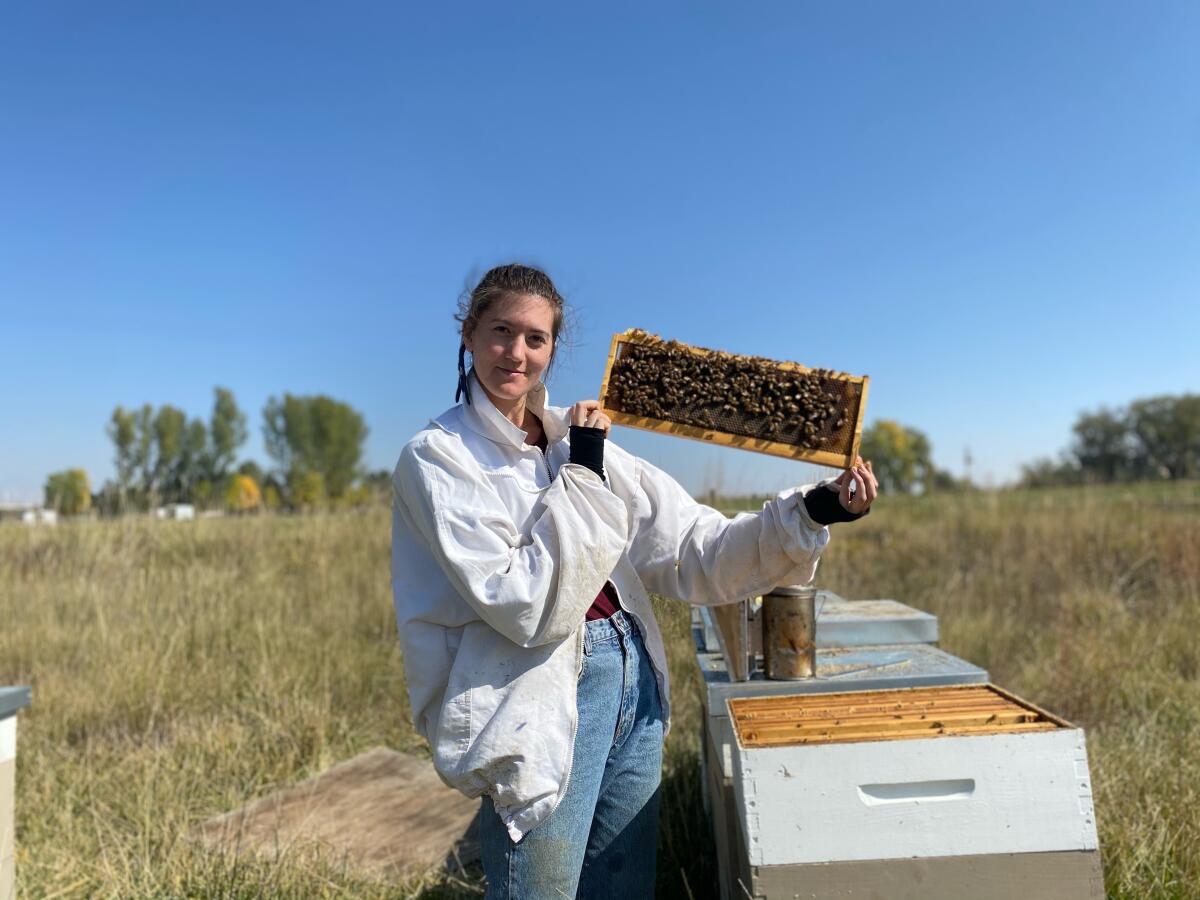Goodbye, Hollywood: Why these film and TV workers decided to ditch L.A.

- Share via
Good morning. It’s Thursday, June, 27. Here’s what you need to know to start your day.
- Film and TV workers are leaving Hollywood. Here’s why.
- Biden and Trump are facing off in the first presidential debate of the 2024 general election.
- Squirrels gone wild in your L.A. yard? Here’s how to get your revenge.
- And here’s today’s e-newspaper
You're reading the Essential California newsletter
Our reporters guide you through our biggest news, features and recommendations every morning
You may occasionally receive promotional content from the Los Angeles Times.
Why these film and TV workers decided to leave L.A.
A few weeks ago, we covered the stunning job losses in Hollywood and what this means for the film and TV businesses. The pandemic, streaming wars and twin strikes by writers and actors are some of the reasons why many Hollywood jobs haven’t come back.
Amid declining streaming numbers, networks and studios are reducing their programming slates, causing career opportunities to dwindle while the cost of living in L.A. has remained high.
Some industry workers continue to cling on to the limited opportunities left in Hollywood. But many others — unwilling to endure expensive rents, mortgages and living costs as well as the uncertainty of how artificial intelligence will effect their jobs — have left Los Angeles for places such as Atlanta, Colorado and New Mexico.
This exodus of film and TV workers might signal a shift in Hollywood. Hollywood has changed in ways that have made it unrecognizable from what it looked like years ago.
But, for better or worse, this mass departure also symbolizes the adaptability of Hollywood creatives: Those forced to change course due to tough, inevitable circumstances can find purpose elsewhere, in different terrains.
Here is what two industry workers who left Los Angeles told my colleague Josh Rottenberg.
A list of credits takes a ‘jack-of-all-trades’ back home
When Robby Piantanida arrived in L.A. nine years ago, he already had seven years of filmmaking experience under his belt and yet, having no true network to rely on in L.A., his daily earnings plummeted.
One job led to another and soon, he accumulated a vast selection of credits including cinematography, editing, direction, visual effects and scoring by working on projects like PBS’s documentary on L.A. art dealer Jeffrey Deitch and a new series, “How Music Got Free,” executive produced by Eminem and LeBron James.
“I’m a jack-of-all-trades kind of guy,” he said. But it hasn’t been enough to stay in the game as freelance opportunities declined.
And securing a stable rent in L.A. for Piantanida’s family of three, after his wife lost her six-figure salary working at a talent agency, became extensively challenging.

So, this month, Piantanida, his wife and their 2-year-old daughter left L.A. for his parents’ 12-acre property in his native Tyler, Texas, not only to save money but also to regroup and decide what their next step is going to look like.
There, they will be paying $350 a month to live in a cottage on the property and be able to rely on his parents and sister for childcare. Though he’s gotten a corporate job, Piantanida hopes Texas’ generous tax incentives for film production will help bring local projects his way.
Piantanida hopes that in a year, if Hollywood refurbishes itself and his wife lands a new job, they can move back West and buy a house in Lake Arrowhead, the Bay Area or Seattle.
“[But my family’s land has] a beautiful spread in the woods, and you can be out there and be totally isolated.” Piantanida said. “This is just a unique time in our lives to take a break and reassess. This slowdown is affecting everyone. We’ll see where we land.”
From Hollywood buzz to nature’s real buzz makers
Working as a script supervisor for six years, Talia Brahms’ responsibility was to ensure that every single detail on every film and TV project she worked on was consistent with what was on the script.
But working “gig to gig” because of the relatively low pay eventually led her to feel that “something was missing” from her life, that she “wanted to do something more with [her] life” and that the industry “became soul-sucking, in a way.”
When everything including Hollywood shut down because of the pandemic, Brahms, who had always been environmentally conscious and disturbed by the waste she saw on film sets, set out to explore her interest in nature by taking a beekeeping course outside of L.A.
When the course suddenly became yet another Zoom class, Brahms found another opportunity to get the hands-on experience she wanted through the Worldwide Opportunities on Organic Farms program in the mountains of Colorado.
Initially, she planned to stay there for a month. But when she was offered a job as a beekeeper, she took a leap of faith. Now, more than three years later, she lives outside of Boulder and works as a farm assistant and manages five beehives at multiple locations.
“Even before I moved to Colorado, I really liked the idea of having a homestead,” she said about her passion for sustainable farming. “I feel like I’m just an apprentice and I’m wide open to take in all of the information about all these practices I’m really excited to learn about.”
Though she gets paid minimum wage, she supplemented her income for a while through bartending which has been “enough,” and splits a $1,200-a-month rent for a two-bedroom condo with her partner.
“When I moved out here, it was really a struggle at first and I had this epiphany,” she told Josh. “I had been having all these problems in L.A., and I thought moving to a different state would fix all of that. I had a moment of clarity, like, ’Oh, I think it’s just me — I think I need to grow.’ And Colorado and beekeeping really allowed me to do that.”
To learn more about why film and TV workers are leaving L.A., read Josh’s in-depth story.
Today’s top stories

Biden and Trump debate
- What time is tonight’s Biden-Trump debate?
- Trump wants mass deportations. Can Biden sell a more nuanced approach during the debate?
- Whoever wins the Biden-Trump debate, CNN hopes to claim victory.
- Column: In Biden-Trump debate, what they do — not what they say — could determine the winner
Crime and courts
- The Supreme Court wipes out anti-corruption law that bars officials from taking gifts for past favors.
- The Supreme Court dismisses Republican suit claiming Biden officials censored social media.
- Matthew Perry’s death probe ties people to ketamine procurement, but charges still unclear, sources say.
- Lawmakers’ last-minute reversal could let restaurants keep service fees.
- Border patrol officers falsely imprisoned a 9-year-old U.S. citizen, judge rules.
- His toddler overdosed on fentanyl. Dad says L.A. County welfare failed, will sue for $65 million.
Education
- LAUSD approves $18.4-billion budget amid concerns over police, the arts and the future.
- Retiring UC Berkeley chancellor sounds off on protests, enrollment and housing.
More big stories
- L.A. City Council declares Marilyn Monroe house a cultural landmark, saving it from destruction.
- LA28 plans ambitious Coliseum makeover, building a track on top of the existing field.
- How a San Diego doctor led the antiabortion movement to embrace controversial pill ‘reversal.’
- Is bird flu in cattle here to stay?
- California recalls cannabis vape many months after it was told of contamination.
- Why you should think twice before taking a daily multivitamin to ward off death.
- Too much screen time harms children, experts agree. So why do parents ignore them?
- Father who drove wife and children off cliff receives mental health diversion.
- Sewage spills cause beach closures in Morro Bay and San Diego.
- L.A. County juvenile halls are so violent that many officers are skipping work.
- Bill Cobbs, character actor known for ‘Air Bud’ and ‘The Bodyguard,’ dies at 90.
Get unlimited access to the Los Angeles Times. Subscribe here.
Commentary and opinions
- Charles McNulty: Dreading four more months of the presidential campaign? Our critic turned to the classics.
- Jackie Calmes: If Trump claims he’s master of the economic universe in the debate, he’ll be lying.
Today’s great reads
Two brothers and 16 sticks of dynamite: The bombing of the L.A. Times. About 100 workers were in the Los Angeles Times building at 1:07 a.m. Oct. 1, 1910. Then 16 sticks of dynamite exploded at the anti-union newspaper, and people began dying.
Other great reads
- The desperate hours: a pro baseball pitcher’s fentanyl overdose.
- The average wedding costs $41,000 in California. 16 couples share what they really spent.
- Want to ease the pain of loss? Create a grief ritual.
How can we make this newsletter more useful? Send comments to essentialcalifornia@latimes.com.
For your downtime
Going out
- 🐿️ Squirrels gone wild in your L.A. yard? Here’s how to get your revenge.
- 🥾 The 70 best hikes in L.A.
- 🎢 Every thrill ride at Six Flags Magic Mountain, ranked.
Staying in
- 📺 Arranged beautifully like a musical album, Season 3 of ‘The Bear’ is a hit.
- 🧑🍳 Here’s a recipe for brothy shrimp meatballs with sungold tomatoes.
- ✏️ Get our free daily crossword puzzle, sudoku, word search and arcade games.
And finally ... from our archives

On June 27, 2023, Ryan Seacrest was announced as the new host of “Wheel of Fortune,” replacing long-time host Pat Sajak.
Sajak took one last spin on the show earlier this month.
Have a great day, from the Essential California team
Defne Karabatur, fellow
Kevinisha Walker, multiplatform editor and Saturday reporter
Christian Orozco, assistant editor
Stephanie Chavez, deputy metro editor
Karim Doumar, head of newsletters
Check our top stories, topics and the latest articles on latimes.com.
Sign up for Essential California
The most important California stories and recommendations in your inbox every morning.
You may occasionally receive promotional content from the Los Angeles Times.






